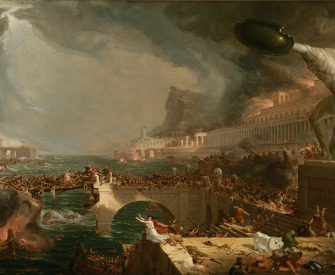All the greater known causes on climate are constant, and therefore we should be authorized to conclude that the cycles of our seasons would be regular and invariable. The heavenly bodies whose movements occasion the alternation of spring and summer and autumn and winter revolve in almost unchanging orbits; the constituents of the atmosphere have been precisely determined and are everywhere and at all times substantially the same.
We have certainly as yet little cause to hope that climatic influences can ever be subject, in any important degree, to voluntary human modification or control. But though man cannot at his pleasure command the rain and the sunshine, the wind and frost and snow, yet it is certain that climate itself has in many instances been gradually changed and ameliorated or deteriorated by human action. The draining of swamps and the clearing of forests perceptibly effect the evaporation from the earth and, of course, the mean quantity of moisture suspended in the air. The same causes modify the electrical condition of the atmosphere and the power of the surface to reflect, absorb, and radiate the rays of the sun, and consequently influence the distribution of light and heat, and the force and direction of the winds. Within narrow limits too, domestic fires and artificial structures create and diffuse increased warmth, to an extent that may effect vegetation. The mean temperature of London is a degree or two higher than that of the surrounding country, and Peter Simon Pallas believed that the climate of even so thinly a peopled country as Russia was sensibly modified by similar causes. But though, in general, climatic influences are beyond our reach, their pernicious tendencies may sometimes be neutralized or overcome.
I desire to draw your special attention to the introduction of a better economy in the management of our forestlands. The increasing value of timber and fuel ought to teach us that trees are no longer what they were in our fathers’ time, an encumbrance. We have undoubtedly already a larger proportion of cleared land in Vermont than would be required, with proper culture, for the support of a much greater population than we now possess, and every additional acre both lessens our means for thorough husbandry by disproportionately extending its area and deprives succeeding generations of what, though comparatively worthless to us, would be of great value to them. The inconveniences resulting from a want of foresight in the economy of the forest are already severely felt in many parts of New England and even in some of the older towns in Vermont. Steep hillsides and rocky ledges are well suited to the permanent growth of wood, but when in the rage for improvement they are improvidently stripped of this protection, the action of sun and wind and rain soon deprives them of their thin coating of vegetable mold, and this, when exhausted, cannot be restored by ordinary husbandry. They remain therefore barren and unsightly blots, producing neither grain nor grass, and yielding no crop but a harvest of noxious weeds to infest with their scattered seeds the richer arable grounds below. But this is by no means the only evil resulting from the injudicious destruction of the woods. The vernal and autumnal rains, and the melting snows of winter, no longer intercepted and absorbed by the leaves or the open soil of the woods, but falling everywhere upon a comparatively hard and even surface, flow swiftly over the smooth ground, washing away the vegetable mold as they seek their natural outlets, fill every ravine with a torrent, and convert every river into an ocean. The suddenness and violence of our freshets increases in proportion as the soil is cleared; bridges are washed away, meadows swept of their crops and fences, and covered with barren sand, or themselves abraded by the fury of the current, and there is reason to fear that the valleys of many of our streams will soon be converted from smiling meadows into broad wastes of shingle and gravel and pebbles, deserts in summer, and seas in autumn and spring. The changes, which these causes have wrought in the physical geography of Vermont within a single generation are too striking to have escaped the attention of any observing person, and every middle-aged man who revisits his birthplace after a few years of absence looks upon another landscape than that which formed the theater of his youthful toils and pleasures. The signs of artificial improvement are mingled with the tokens of improvident waste, and the bald and barren hills, the dry beds of the smaller streams, the ravines furrowed out by the torrents of spring and the diminished thread of interval that skirts the widened channel of the rivers seem sad substitutes for the pleasant groves and brooks and broad meadows of his ancient paternal domain. If the present value of timber and land will not justify the artificial replanting of grounds injudiciously cleared, at least nature ought to be allowed to reclothe them with a spontaneous growth of wood. In many European countries the economy of the forest is regulated by law; but here, where public opinion determines, or rather in practice constitutes law, we can only appeal to an enlightened self-interest to introduce the reforms, check the abuses, and preserve us from an increase of the evils I have mentioned.
From an address to the Agricultural Society of Rutland County. As a U.S. congressman from Vermont, Marsh helped found the Smithsonian Institution and design the Washington Monument. In 1861 he became an ambassador to the newly created Kingdom of Italy. A lifelong conservationist, Marsh published Man and Nature in 1864; it was one of the earliest texts arguing that human action could have significant and lasting effect on the environment. “Of all organic beings,” Marsh wrote, “man alone is to be regarded as essentially a destructive power.”
Back to Issue





